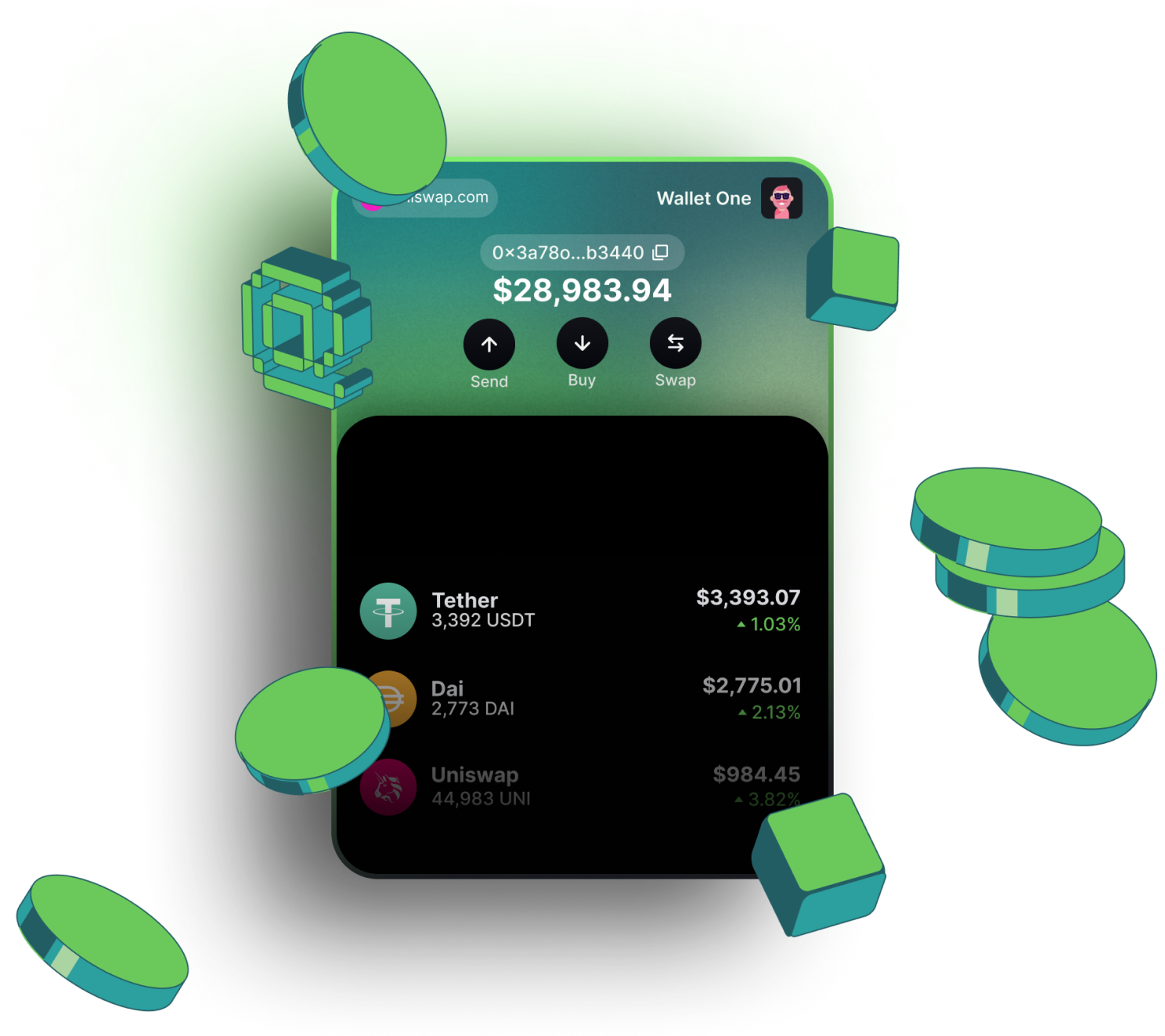Wigwam is the best  OpBNB blockchain crypto wallet
OpBNB blockchain crypto wallet
Download Extension
Why choose the Wigwam crypto app?
Work with OpBNB Testnets and Mainet
Buy OpBNB tokens, including native token, by using a credit card
Swap OpBNB-based tokens directly in the wallet
Possibility to connect the wallet to all OpBNB Blockchain dAps: DeFi, DAO, Gamings, etc
How to get a OpBNB address in Wigwam web wallet
Create a wallet in Wigwam
Choose a OpBNB network from the dropdown menu
Copy you OpBNB address
OpBNB blockchain review
The BNB Chain, which was earlier known as Binance Smart Chain (BSC), changed recently to enhance decentralization and make it open beyond Binance. This rebrand gave rise to the BNB Beacon Chain for governance and the BNB Smart Chain (BSC) for consensus. A new era had begun for the platform.
opBNB is the layer L2, which is created to boost the performance and ecosystem sustainability of the BNB Chain. It executes the OP Stack, a modified version of the Optimism technology, to make the storage procedure more efficient on the blockchain. Through L.1.5 "SharedPool" or another cache layer addition, opBNB intends to raise the cache hit rates and thus decrease the number of redundant database searches and improve the data retrieve efficiency.
History and Origin
BNB Chain was launched in July 2017 by Binance Holding Ltd. to enhance financial independence globally through the use of electronic payment methods and enable anyone to make more money by saving, spending, or giving it away. With its scalability, decentralization, and security in mind, the BNB Chain was devised with the mission of solving vexing problems of the blockchain industry, providing progressive solutions like its Parlia mechanism in addition to its open-source, decentralized wallet (Trust Wallet) and its BNB chain which goes beyond other chains, being EVM-compatible and smart contracts-supporting.
Main advantages of OpBNB blockchain
High Performance and Scalability
opBNB is developed to provide the speed and capacity that can handle up to 100 million gas per second. Without this level of performance, the Web3 ecosystem cannot scale and the performance improvement over traditional Layer1 solutions is also promising. Off-chain transaction processing of opBNB and uplifting of the compressed transaction data on-chain eliminates the BSC restrictions of throughput and transaction speed.
Cost Efficiency
Cost-effectiveness is the number one feature of opBNB. What it really aspires to is to keep an average gas fee for transfer units to $0.005 thus making it universally accessible to a wider user base. This reduction in transaction costs is the biggest advantage that opBNB has in competition with regular layer-1 gas rates, thus being an exceptionally low-cost layer-2 solution for BSC users and developers.
Ethereum Compatibility and Integration
opBNB completely backs the Ethereum Virtual Machine (EVM) which guarantees a continuation of the current BSC ecosystem utilities and infrastructures. This compatibility ensures that any smart contract or application built for Ethereum or BSC will similarly work on opBNB without any modifications at all. In addition, opBNB can also share a compatible structure with the BNB ecosystem, so users can freely use assets of the BNB ecosystem like BNB.
Open Ecosystem and Community Involvement
opBNB builds a platform for projects that are open to each other while collaborating. The ecosystem allows the projects to benefit from each other. OP stack empowering, opBNB can now be a part of this network of chains that are technologically compatible with each other and interact. Through this transparent open ecosystem model, not only network effects, security, and innovation are increased, but also community involvement and feedback are encouraged, becoming a driving force for opBNB continuous growth.
What Consensus Algorithm Does opBNB Use?
opBNB deploys the Parlia consensus algorithm which is the hybrid mechanism of Delegated Proof-of-Stake (DPoS) and Proof-of-Authority (PoA). The mechanism instead utilizes a network of 21 validators and delegators, where the validators are selected based on the following criteria: hardware capability, skills, reliability, and the minimum stake of 2000 BNB. The BNB top 21 validators, securely selected through staking, validate blocks daily, and in the meantime, delegators can participate in governance and earn a share of the network fees.
How opBNB Technically Solved Problems with Scalability, Decentralization, and Speed?
opBNB solves the problems of scalability, decentralization, and speed through its layer-2 scaling solution. It provides high-speed transactions and EVM compatibility to the ecosystem which enables various smart contracts-based applications to function on it. The purpose of the stake mechanism in Parlia is to increase decentralization in their ecosystem by the delegation of users and the voting for validators through the staking of their BNB tokens. Engagement of delegators provides validators with the ability to produce blocks and thus increases the transaction speed.
Who are the Main Players in the opBNB?
In the opBNB ecosystem, the main players include:
Validators: This involves checking the validity of transactions and adding new blocks to the chain by participating in a consensus mechanism
Delegators: By staking BNB, you get the right to vote among validators and are rewarded with a portion of network fees in exchange.
DeFi Ecosystem on opBNB
The DeFi ecosystem on opBNB is bringing new business models and services to the market, disrupting established orders, and lowering costs, risks, and delays. It encompasses various services such as "PancakeSwap V2", “PancakeSwap V3" “Biswap” , Lending platforms like "Venus Protocol”, “Alpaca Finance”, or “dForce”, Derivatives exchanges such as "Pancake Bunny", "Cream" and "Ellipsis Finance" among others.
Tokenomics and Gas Usage on opBNB
BNB, the native Currency on the Binance Blockchain, may be used for trading, staking, and participating. The users of the Binance network need to pay the transaction fee in BNB, as well as BNB grants a 25% discount on transaction fees in the Binance exchange. Validators and Delegators are entitled to BNB as a reward for their efforts in transaction processing and adding blocks.
Conclusion
The launch of opBNB is considered to be an important step in the development of the BNB Chain. Through OP Stack technology from Optimism, opBNB is to increase the throughput, effectiveness, and interoperability of the BNB Chain. This new layer-2 scaling solution, however, not only optimizes data caching and block mining but also keeps EVM compatibility so that developers and users can cover the transition with ease. BNB Chain expansion and development unquestionably shows that opBNB is a creative project in this direction, aiming to achieve more transactions per second, a more decentralized system, and higher blockchain adoption.
FAQ
BNB is the native token for opBNB, used for staking, transaction fees, and participating in the network's governance.
Validators on opBNB are responsible for processing transactions, signing blocks, and securing the network. They play a crucial role in maintaining the integrity and security of the opBNB chain.
Users can stake BNB on opBNB using any BSC wallet that supports opBNB, such as Wigwam wallet or Trust Wallet. To configure these wallets for opBNB, users need to add both the BNB Smart Chain (Layer 1) and the opBNB network (Layer 2) to their wallet settings.





